CALL TODAY 646-846-1136 | EMAIL
Surgical Experts Dedicated to Improving Lives
At Lenox Hill Minimally Invasive Surgery PLLC, Dr. Valery Dronsky and his staff of medical professionals provide compassionate care with the highest ethical & professional standards. In our state of the art facility, we offer surgical services using only the most cutting edge and current procedures and treatments. We specialize in general surgery, including extensive experience in performing hernia repair surgery. Our expertise is in minimally invasive surgery and robotic surgery. Minimally invasive and robotic surgery often allow patients to experience easier recovery than traditional open surgery. They also allow for more precise and less traumatic surgery. When robotic and minimally invasive surgery is not an option, we are also skilled and experienced in traditional open surgical procedures.
Dr. Dronsky is an experienced and highly skilled surgeon having undergone extensive training in school, residency and fellowships. He practices medicine with ethical behavior, compassion and superb bedside manner. In the operating room he exhibits precision mechanical abilities, analytical thinking and the ability to visualize tissue in three dimensions. These innate and learned skills allow Dr. Dronsky to be one of the most dexterous and skilled professionals in New York City and the Country.
Call us: 646-846-1136
PATIENT TESTIMONIALS
Recent Awards
We are honored and deeply appreciative to have consistently received prestigious awards and recognition year after year, establishing us as one of New York’s foremost hospitals for a wide range of general surgeries, safety measures, specialized procedures, and overall excellence in healthcare. At Lenox Hill Minimally Invasive Surgery, our unwavering commitment lies in delivering exceptional care and unwavering support to our patients, guaranteeing their safety and successful recovery throughout their entire surgical experience.
Hospital Quality Awards
 America’s 50 Best Hospitals Award™ (2023, 2022)
America’s 50 Best Hospitals Award™ (2023, 2022)
Top 1% in the nation for providing the highest clinical quality year over year.

America’s 100 Best Hospitals Award™ (2021)
Top 2% in the nation for consistently delivering clinical quality year over year.

America’s 250 Best Hospitals Award™ (2023, 2022, 2021)
Top 5% in the nation for consistently delivering clinical quality.

Patient Safety Excellence Award™ (2023, 2022)
Top in the nation for providing excellence in patient safety by preventing infections, medical errors, and other preventable complications.
Specialty Clinical Quality Awards

America’s 100 Best Hospitals for Cardiac Care Award™ (2023, 2022, 2021, 2020, 2019)
Superior clinical outcomes in heart bypass surgery, coronary interventional procedures, heart attack treatment, heart failure treatment, and heart valve surgery.

America’s 100 Best Hospitals for Coronary Intervention Award™ (2023, 2022, 2021, 2020, 2019)
Superior clinical outcomes in coronary intervention procedures (angioplasty with stent).

America’s 100 Best Hospitals for Prostate Surgery Award™ (2023, 2022, 2021)
Superior clinical outcomes in prostate removal surgery and transurethral resection of the prostate.
Click to see all of our Healthgrades best doctors awards
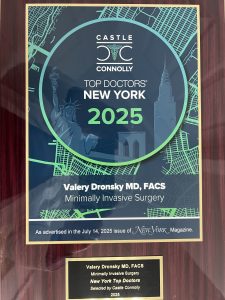
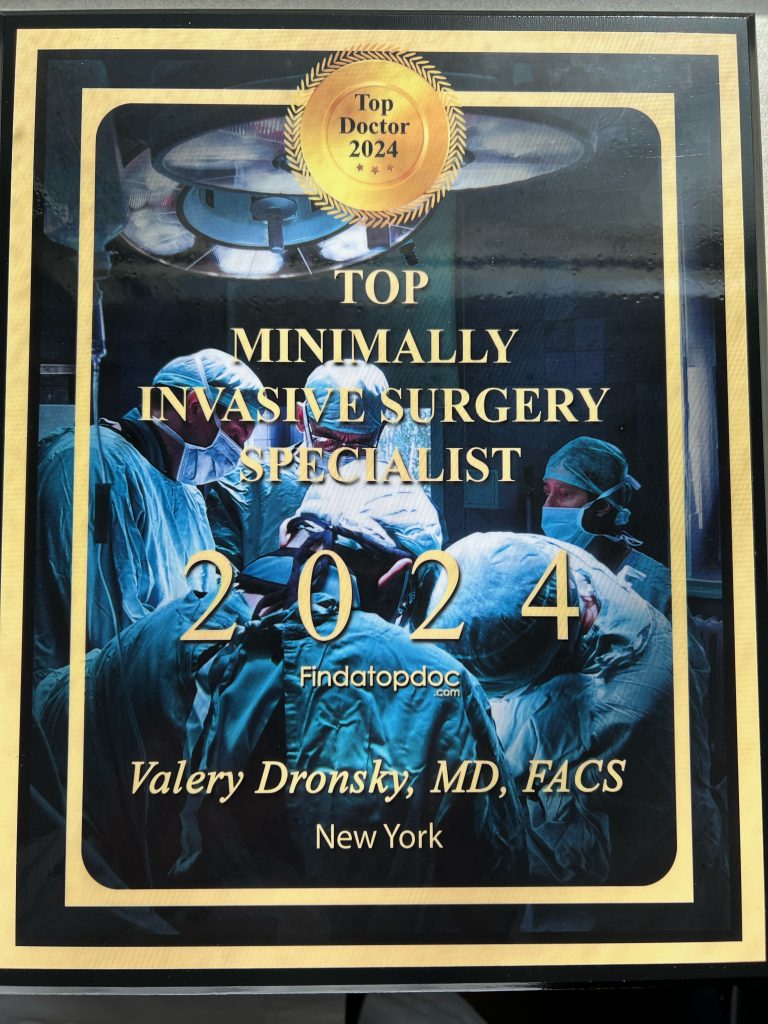
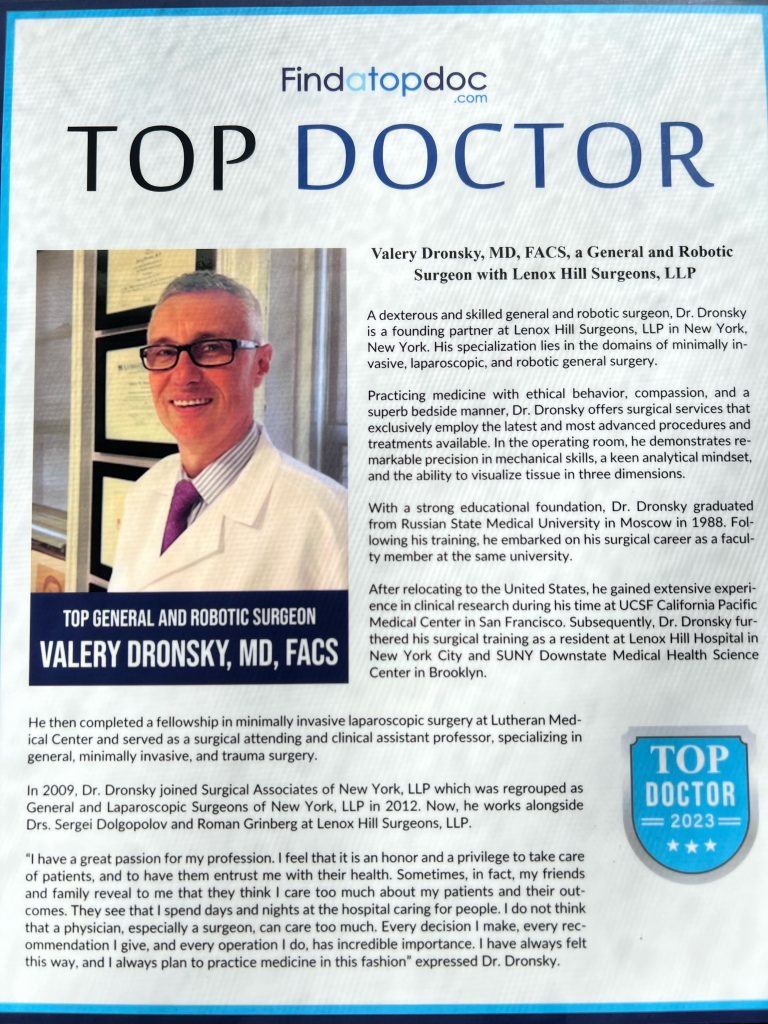


Visit our main website at www.LenoxHillMinimallyInvasiveSurgery.com
Blog Posts are Below:
Monthly Archives: June 2019
Appendix Surgery – What to Expect
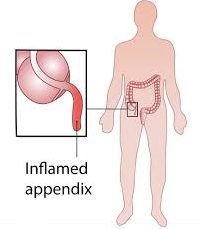 The exact purpose of the appendix is relatively unknown even to modern science. Some experts believe it to be a sort of “home” for healthy bacteria that can be used to fight off dangerous invading cells. Other believe that the appendix does nothing, that it is simply a mass that no longer has a physical function in our daily lives. Regardless of what the appendix is truly intended for, at times it can be inflamed and may require surgical removal.
The exact purpose of the appendix is relatively unknown even to modern science. Some experts believe it to be a sort of “home” for healthy bacteria that can be used to fight off dangerous invading cells. Other believe that the appendix does nothing, that it is simply a mass that no longer has a physical function in our daily lives. Regardless of what the appendix is truly intended for, at times it can be inflamed and may require surgical removal.
Why Would you Need Appendix Surgery?
As mentioned above, we are still a little unclear on many aspects of the functions of the appendix. In other organs, it can be clear that the organ needs to be removed when it fails to function properly. This observation cannot be made effectively for the appendix. However, there are a few specific cases in which it is clear that the removal of the appendix would be beneficial. One common case is appendicitis, or inflammation of the appendix. Although we don’t know exactly what causes appendicitis, this inflammation is clear evidence of a potential issue in the body. It is usually a company by discomfort or pain and the lower right quadrant of the abdominal cavity. Other signs of appendicitis include stomach pain, vomiting, and nausea.
Yet another reason that the appendix may need to be removed is in cases of tumor growth. Should a tumor grow on the appendix and be cancerous, it could potentially metastasize, or spread, to other parts of the body. Studies have shown little to no danger or long-term deficits associated with removal of the appendix. Therefore, it is typically preferred to remove the appendix when there is a risk of cancer. This can serve to protect the rest of the body.
What Happens Before Appendix Surgery?
Prior to appendix surgery, you will have a long discussion with your doctor about your specific case. For example, we will want to know what symptoms you have been having, if you have a family history of any number of ailments, the current medications you are taking, and more. your personal preference with regard to surgical procedures and desired outcomes must also be discussed.
Many specific diagnostic tests can be completed to ensure that the appendix is the culprit. For example, CT scans and ultrasound measures can be used to determine swelling and inflammation of the appendix, a sure sign of infection. On the day of the surgery, it will be important to avoid eating or drinking prior to the surgery. It is generally recommended that eating and drinking be done more than 8 hours prior to the surgery, but your surgeon will have more specific instructions for you. During the surgery itself, we will do what we do best and remove the inflamed or damaged tissue.
What is Appendix Surgery Recovery Like?
After the surgery, you will most likely first notice relief from the pain where your appendix used to be. However, it is still common for some incision and surgical site pain shortly after surgery. This discomfort will subside. While healing from appendix surgery, it will be important to get plenty of rest while still staying active. Although your surgeon will have specific instructions, there are a few that are typically followed. Avoid heavy lifting for at least a few weeks following your surgery. Any kind of strenuous activity that puts pressure or strain on the incision site is to be avoided.
Depending on the precise surgical procedure you undergo, your recovery may take anywhere from 2 weeks to a few months. Due to the fact that the exact function of the appendix is relatively unknown, diet and lifestyle changes typically are not needed.
Do you need to have your appendix removed? Schedule an appointment with the best surgeons in NYC to discuss your needs today.
LENOX HILL MINIMALLY INVASIVE SURGERY
117 E 77th Street
Suite 1A
New York, NY 10075
646-846-1136
admin@lenoxmis.com
——–
References
https://www.sages.org/publications/patient-information/patient-information-for-laparoscopic-appendectomy-from-sages/
https://www.medicinenet.com/appendectomy/article.htm
https://myhealth.alberta.ca/Health/aftercareinformation/pages/conditions.aspx?hwid=ug3573
https://www.webmd.com/digestive-disorders/digestive-diseases-appendicitis#1
Esophagus Surgery – What to Expect
The esophagus is an essential aspect of digestion. Without it, you couldn’t naturally deliver food from your mouth to your stomach. However, there are some times where surgery needs to be performed on the esophagus. How does the esophagus work? What can go wrong and how can surgery help? What is recovery like for esophagus surgery?
How the Esophagus Works
The process of digestion begins as soon as food enters the mouth. The very first step in digestion is chewing, breaking down large chunks of food into smaller, more manageable pieces. Saliva is also brought into the mix to help chemically reduce the food as well. In order for the food to continue to be processed by the stomach, intestines, and other associated organs, it needs to travel down the esophagus. When we first think of it, we might imagine that the esophagus is simply a tube, similar to a straw. We may think that food simply falls down our throat and into our stomach, that the esophagus is a very simple structure. That could not be further from the truth! In fact, there are many muscles that are involved in delivering food from the mouth to the stomach. This can be seen by the fact that we can swallow sitting down, laying down, or even upside down.
Once food enters the esophagus, the smooth muscle tissue within the esophagus contract in a wave formation, gradually pushing food down our throat. Additionally, there are two valve-like structures, called sphincters, that block entrance two or exit from the esophagus. Without these sphincters, food in our mouth would instantly drop down to the stomach. Alternatively, digestive enzymes and juices could come up from the stomach, known as acid reflux.
What can go Wrong
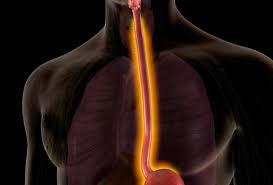 Clearly, the esophagus is more than just a hollow tube for swallowing. Because of the complex nature of the esophagus, there are a number of things that can potentially go wrong. As mentioned above, the sphincters within the esophagus are essential for proper digestion and processing of food. In severe cases of acid reflux, surgery must be performed to tighten the sphincter that separates the esophagus from the stomach. Alternatively, these sphincters can become overly tight or lacks the mobility to properly deliver food to the stomach. In these cases, surgery is required to open up the affected area and facilitate swallowing. Another common situation necessitates surgery of esophagus is cancer.
Clearly, the esophagus is more than just a hollow tube for swallowing. Because of the complex nature of the esophagus, there are a number of things that can potentially go wrong. As mentioned above, the sphincters within the esophagus are essential for proper digestion and processing of food. In severe cases of acid reflux, surgery must be performed to tighten the sphincter that separates the esophagus from the stomach. Alternatively, these sphincters can become overly tight or lacks the mobility to properly deliver food to the stomach. In these cases, surgery is required to open up the affected area and facilitate swallowing. Another common situation necessitates surgery of esophagus is cancer.
As with any cancer, esophageal cancer poses of risk for metastasis, or spreading of cancer throughout the different systems of the body. If cancer has been found in the esophagus and is localized, your surgeon may recommend that some or all of the affected tissue is removed.
Esophageal Surgery Recovery
Of course, the exact length of recovery for esophageal surgery will vary depending on the amount of surgery required. Depending on the specific protocols followed, some esophageal surgeries will only require a few days of recovery before returning home. Other, more involved surgeries may require an extended stay with close observation. Some changes may need to be made in your lifestyle, such as changes in diet and temporary limiting of strenuous activity.
As a general principle, any activity that causes pain in the affected area should be avoided for the first few weeks. Your surgeon will have more specific instructions for you as far as what to expect with your precise procedure, what to do to prepare, and what lifestyle changes may need to be made.
—
Are you in need of esophageal surgery? Get in touch with the best surgeons in NYC to schedule an appointment today.
———
References:
https://surgery.ucsf.edu/conditions–procedures/esophageal-cancer.aspx
https://www.cancer.org/cancer/esophagus-cancer/treating/surgery.html
https://www.ariahealth.org/programs-and-services/surgery/general-surgery/surgery-for-esophagus















